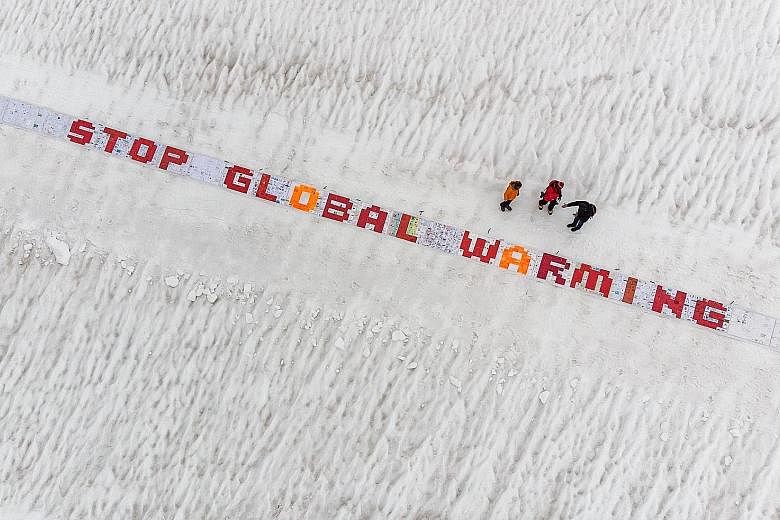INCHEON (South Korea) • This week, representatives of more than 130 countries and about 50 scientists have packed into a large conference centre near the South Korean capital going over every line of an all-important report: What chance does the planet have of keeping climate change to a moderate, controllable level?
They are trying to reach consensus on what it would mean - and what it would take - to limit the warming of the planet to just 1.5 deg C, when 1 deg C has already occurred and greenhouse gas emissions remain at record highs.
"It's the biggest peer-review exercise there is," said Mr Jonathan Lynn, head of communications for the United Nations' Intergovernmental Panel on Climate Change (IPCC). "It involves hundreds or even thousands of people looking at it."
The meeting in Incheon is aimed at finalising the report - a summary for policymakers - ready for an official release on Monday.
The IPCC, the world's definitive scientific body when it comes to climate change, was awarded the Nobel Peace Prize a decade ago and has been given what may rank as its hardest task yet.
It must not only tell governments what we know about climate change - but also how close they have brought us to the edge. And by implication, how much those governments are failing to live up to their goals for the planet, set in the 2015 Paris climate agreement.
Limiting warming to 1.5 deg C is the most stringent and ambitious goal in that agreement, originally put there at the behest of small island nations and other highly vulnerable countries.
But it is increasingly being regarded by all as a key guardrail, as severe climate change effects have been felt in just the past five years - raising concerns about what a little bit more warming would bring.
"Half a degree doesn't sound like much till you put it in the right context," said Mr Durwood Zaelke, president of the Institute for Governance and Sustainable Development. "It's 50 per cent more than we have now."
The idea of letting warming approach 2 deg C increasingly seems disastrous in this context.
Parts of the planet, like the Arctic, have already warmed beyond 1.5 deg C and are seeing alarming changes. Antarctica and Greenland, containing many metres of sea-level rise, are wobbling.
Major die-offs have hit coral reefs around the globe, suggesting that an irreplaceable planetary feature could soon be lost.
It is universally recognised that the pledges to cut greenhouse gas emissions made in Paris would lead to a warming far beyond 1.5 deg C - more like 2.5 or 3 deg C, or even more.
"The pledges countries made during the Paris climate accord don't get us anywhere close to what we have to do," said Dr Drew Shindell, a climate expert at Duke University and one of the authors of the IPCC report. "They haven't really followed through with actions to reduce their emissions in any way commensurate with what they profess to be aiming for."
At issue is what scientists call the "carbon budget". Heat-trapping carbon dioxide is the main greenhouse gas - burning fossil fuels, deforestation and wildfires are major sources - and CO2 reached record levels in the atmosphere last year.
Because the gas lives in the atmosphere for so long, it steadily accumulates because forests, oceans and soils cannot absorb all that extra CO2 that mankind is creating.
So there is only a limited amount of CO2 that can be emitted before it becomes impossible to avoid a given temperature, like 1.5 deg C. Unless emissions start to decline - which gives us more time.
This is why scenarios for holding warming to 1.5 deg C require rapid and deep changes to how we get energy.
The window may now be as narrow as around 15 years of current emissions, but since we do not know for sure, according to the researchers, that really depends on how much of a margin of error we are willing to give ourselves.
"It would be an enormous challenge to keep warming below a threshold" of 1.5 deg C, said Dr Shindell, bluntly. "This would be a really enormous lift."
So enormous, he said, that it would require a monumental shift towards decarbonisation.
By 2030 - barely a decade away - the world's emissions would need to drop by about 40 per cent. By the middle of the century, societies would need to have zero net emissions.
What might that look like? In part, it would include things such as no more petrol or diesel-powered vehicles, a phase-out of coal-fired power plants and airplanes running on biofuels, he said.
"It's a drastic change," he said. "These are huge, huge shifts... This would really be an unprecedented rate and magnitude of change."
And that is just the point - 1.5 deg C is still possible, but only if the world goes through a staggering transformation.
WASHINGTON POST

